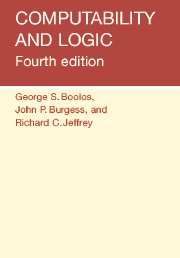Book contents
- Frontmatter
- Contents
- Preface
- COMPUTABILITY THEORY
- BASIC METALOGIC
- 9 A Précis of First-Order Logic: Syntax
- 10 A Précis of First-Order Logic: Semantics
- 11 The Undecidability of First-Order Logic
- 12 Models
- 13 The Existence of Models
- 14 Proofs and Completeness
- 15 Arithmetization
- 16 Representability of Recursive Functions
- 17 Indefinability, Undecidability, Incompleteness
- 18 The Unprovability of Consistency
- FURTHER TOPICS
- Hints for Selected Problems
- Annotated Bibliography
- Index
12 - Models
Published online by Cambridge University Press: 05 June 2012
- Frontmatter
- Contents
- Preface
- COMPUTABILITY THEORY
- BASIC METALOGIC
- 9 A Précis of First-Order Logic: Syntax
- 10 A Précis of First-Order Logic: Semantics
- 11 The Undecidability of First-Order Logic
- 12 Models
- 13 The Existence of Models
- 14 Proofs and Completeness
- 15 Arithmetization
- 16 Representability of Recursive Functions
- 17 Indefinability, Undecidability, Incompleteness
- 18 The Unprovability of Consistency
- FURTHER TOPICS
- Hints for Selected Problems
- Annotated Bibliography
- Index
Summary
A model of a set of sentences is any interpretation in which all sentences in the set are true. Section 12.1 discusses the sizes of the models a set of sentences may have (where by the size of a model is meant the size of its domain) and the number of models of a given size a set of sentences may have, introducing in the latter connection the important notion of isomorphism. Section 12.2 is devoted to examples illustrating the theory, with most pertaining to the important notion of an equivalence relation. Section 12.3 includes the statement of two major theorems about models, the Löwenheim—Skolem (transfer) theorem and the (Tarski—Maltsev) compactness theorem, and begins to illustrate some of their implications. The proof of the compactness theorem will be postponed until the next chapter. The Löwenheim—Skolem theorem is a corollary of compactness (though it also admits of an independent proof, to be presented in a later chapter, along with some remarks on implications of the theorem that have sometimes been thought ‘paradoxical’).
The Size and Number of Models
By a model of a sentence or set of sentences we mean an interpretation in which the sentence, or every sentence in the set, comes out true. Thus Γ implies D if every model of Γ is a model of D, D is valid if every interpretation is a model of D, and Γ is unsatisfiable if no interpretation is a model of Γ.
- Type
- Chapter
- Information
- Computability and Logic , pp. 137 - 152Publisher: Cambridge University PressPrint publication year: 2002



